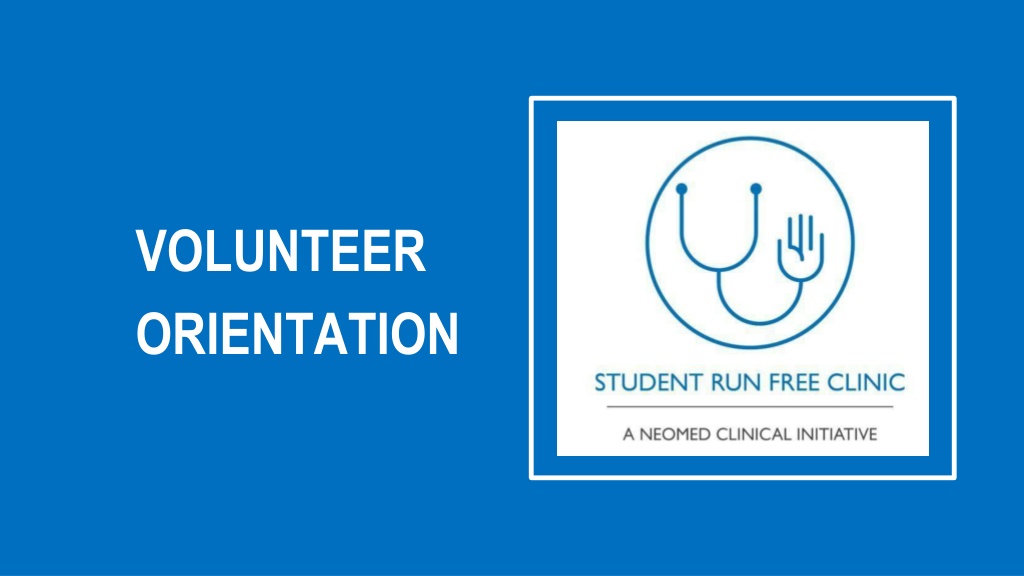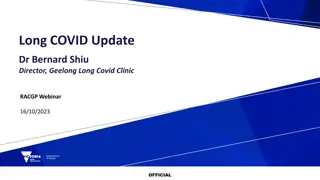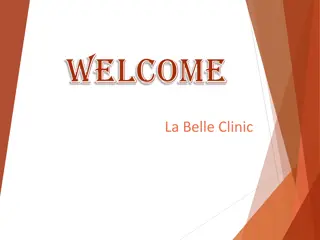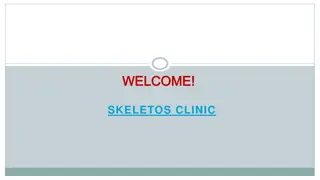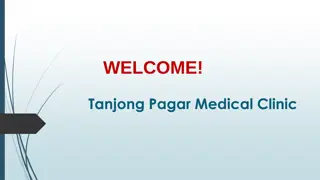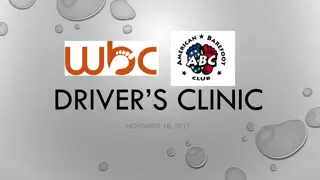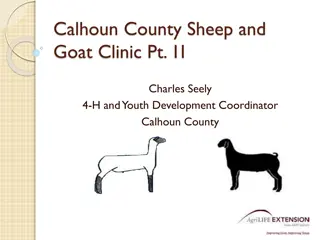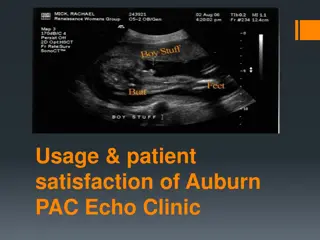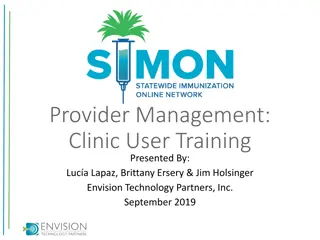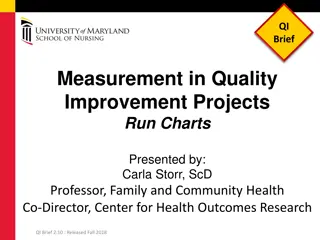Understanding the Student-Run Free Clinic at NEOMED
The Student-Run Free Clinic (SRFC) at NEOMED is a vital initiative run by students to provide high-quality healthcare services to the uninsured and underinsured residents of Northeast Ohio. Under the guidance of medical professionals, volunteers serve the community on clinic days, supporting the objectives of the clinic to improve access to care and foster a learning environment. As a new volunteer, familiarize yourself with the clinic's operations, location, volunteer requirements, and the impact it has on Portage County residents in need of healthcare.
Download Presentation

Please find below an Image/Link to download the presentation.
The content on the website is provided AS IS for your information and personal use only. It may not be sold, licensed, or shared on other websites without obtaining consent from the author. Download presentation by click this link. If you encounter any issues during the download, it is possible that the publisher has removed the file from their server.
E N D
Presentation Transcript
VOLUNTEER ORIENTATION
WHAT IS THE STUDENT RUN FREE CLINIC AT NEOMED? What does SRFC mean? SRFC stands for Student-Run Free Clinic SRFC is completely run by students under the supervision of Medical Director, John Boltri, MD Health Director, Alicia Bond, MD How does SRFC fit in with OutReach? Students in OutReach serve as administrative and clinical volunteers to SRFC Fundraisers planned and held by students of OutReach help support SRFC
WHAT IS THE STUDENT RUN FREE CLINIC AT NEOMED? As a new volunteer, we hope that this presentation will allow you to be familiar with the clinic, its function, and your role within it. Location: Student Run Free Clinic at NEOMED (2nd floor of NEW Center in Student Services adjacent to Wasson Center) 4209 St. Rt. 44, Rootstown, Ohio 44272 Phone: 330-552-7080 Email: clinic@outreach.neo.org Clinic Days: every Saturday morning
WHAT IS THE STUDENT RUN FREE CLINIC AT NEOMED? SRFC serves uninsured and underinsured residents of Northeast Ohio NEOMED is located within Portage County Approximately 6.5% of Portage County Residents do not have health insurance 10.7% of adults in Ohio wanted to see a doctor but did not due to cost. Portage County is home to approximately 162,080 residents That s 17,000 residents in Portage county who are potentially going a year without any type of healthcare maintenance/procedures.
WHAT IS THE STUDENT RUN FREE CLINIC AT NEOMED? Objectives of SRFC: 1. To provide high quality, non-emergent, no-cost health care to the medically underserved residents of Northeast Ohio 2. Increase access to care and improve quality of life of community members through primary care services and medication management 3. Foster a learning environment for students at NEOMED
VOLUNTEER REQUIREMENTS Complete onboarding process prior to volunteering (next slide) Volunteer at SRFC at least one clinic day per semester (fall, spring, summer) Assist with at least one Outreach or SRFC event during your first year of volunteering (i.e. fundraising events, community service events) More information will be provided from Outreach as the year progresses Arrive no later than 07:30 at SRFC on the clinic day you signed up. Dress professionally with a white coat. Bring headphones, laptop, and any medical equipment you have (i.e. stethoscope, etc.) Be an active team player. Engage in each patient encounter and learning experiences. Utilize peers and faculty to enhance your knowledge. You will be expected to present at least one thing you learned at the end of each clinic day.
VOLUNTEER REQUIREMENTS Please review all the listed documents on the SRFC training website.
VOLUNTEER REQUIREMENTS The next section will take you to the videos that all volunteers must review. Please keep your STFM certificate saved for your personal records.
VOLUNTEER REQUIREMENTS If you are a Pharmacy volunteer or planning to join the Laboratory team, there are additional training that you must complete. Once finished, you will click the Attestation Link certifying that you have completed all trainings and reviewing all documents.
VOLUNTEER REQUIREMENTS Immunization Records Immunizations required for SRFC are the same as NEOMED immunization requirements Be sure to have all the appropriate immunization records uploaded to Castle Branch (for questions, please contact Monica Lenox, mlenox@neomed.edu) The volunteer coordinators will be in contact with Monica Lenox to ensure all SRFC volunteers are compliant and up to date with immunizations Basic Life Support (BLS) Completion of this is a NEOMED requirement and the session will be incorporated into your curriculum
SCHEDULING EXPECTATIONS Volunteers will receive an email each semester that includes a SignUp Genius links. These can also be found on the SRFC Home Page. This link should be used to sign up for the date they would like to volunteer. Volunteers should sign up for volunteer spots that correspond with their year and the level of training they have completed. Dates are allotted on a first come, first serve basis. Please allow 1 week after the release of the sign-up links for your classmates to all secure one spot. After that, you may sign up for as many additional dates as you would like. If you need to cancel your sign-up within one week of a clinic day, you are responsible for finding a replacement. Absence without notification results in termination as a volunteer. For scheduling adjustments, please contact the Scheduling Director.
CLINIC DAY OVERVIEW & FLOW Arrive at 07:30 at SRFC Conference Room 07:30-07:45: Clinic Overview, Morning Rounds, Team Assignments (Assistant Clinic Chief), and distribution of role badges 07:45-08:00: Educational Topic (Clinic Chief) 08:00-08:30: Team Huddle (led by Team Leader) - your team will be given a color name (i.e. red team) Triage orientation (led by Assistant Clinic Chief) 08:30-1300: Patient encounters and care 14:00/15:00: Complete Practice Fusion notes, wrap up miscellaneous tasks, and debrief with all clinic volunteers Clinic day ends at various times depending on number and length of appointments. Students may bring food to eat during down times, there is a break room with a fridge
CLINIC DAY OVERVIEW & FLOW - PATIENT VISIT Patient will be taken to a room and vitals will be completed by the Triage volunteer Full team works together to complete the initial encounter. Please refer to SRFC Volunteer Roles as to how the encounter should flow. After the initial encounter, team briefly debriefs to discuss assessment and plan. Team will present patient to attending physician. Team will re-enter patient room with attending physician. A final assessment and plan will be discussed with the patient After the encounter, the team will complete the care plan, laboratory orders, prescriptions, and schedule a follow-up appointment. After the patient visit has been prioritized and the patient has left, the team can then work to finalize the progress note in Practice Fusion. Remember, Care Plan will be printed to each patient and given to them before he/shel eaves as a summary of their visit. This takes priority over any part of the note. Write 1-2 things you learned with each patient encounter as you will be sharing this at the end of clinic day.
CLINIC DAY OVERVIEW & FLOW - ROLES Every member to introduce him/herself to patient. Team leader will describe flow of the encounter to the patient. Allergies and medication reconciliation by Junior MTM member Behavioral health questionnaire and past medical and surgical history by junior team member History, ROS, and social history will be taken primarily by junior and senior team members with the team leader filling in as need be. A physical examination will be performed by senior team member with the team leader assisting as need be. MTM junior member will ask if patient is interested in community service or patient education resources. If yes, please notify community service and patient education team. MTM leader will ask any pertinent information for medications, etc that he/she deems necessary to create an assessment and plan.
CLINIC DAY OVERVIEW & FLOW - TELEHEALTH Team leader will be oriented to whether the visit is a phone call or video (Doxy.Me) appointment Verbal consent for telehealth visit must be provided by the patient before beginning visit Team leader will call patient and all team members will participate in the initial encounter Physical exam is deferred. Team will inform patient that they will staff the case with the attending physician and call the patient back. Team will debrief and discuss assessment and plan. Team and attending physician will call patient back to finalize assessment and plan. Care Plan (after visit summary) will be mailed to patient
CLINIC DAY OVERVIEW & FLOW - WHITEBOARD Secure Microsoft Excel document or Google Drive to keep track of patient care during clinic day Shows patient assignments to teams Active, live time board that shows the progress of a patient visit Must be updated in real time by triage and junior team members (see Volunteer Roles for more information) Example shown on following slide
CLINIC DAY OVERVIEW & FLOW - NOTE Practice Fusion (Electronic Medical Record) https://www.practicefusion.com/ Assistant clinic chief will provide you with login information. A code is necessary to get access to Practice Fusion. You will be given this code upon your arrival to Clinic. Reviewing the Practice Fusion tutorial is part of the required volunteer onboarding. Don t hesitate to review prior to clinic if you need a refresher.
REPORTING CONCERNS If you see something say something, and never worry alone! For emergent safety concerns, first immediately report to the attending on site. Our policy is outlined in the policy and procedure Examples of Safety Concerns: Medical emergencies see policy manual for medical emergency policy (repot to clinic chief or attending immediately) Violent patient Biohazard material spill Suspected Abuse Other concerns should be reported to the clinic chief, SRFC Board Member, or the Volunteer Coordinators (NIkhil Harish M2) directly or at volunteers@outreachneo.org. Staffing issues Inappropriate behavior Technology related issues Treatment of volunteers Concern and Complaint log is reviewed at each month at the SRFC Student Board Meeting.
VOLUNTEER ROLES Triage Laboratory Trainee Undergraduate Student Laboratory Manager Physician Assistant Student Education Team Member Education Team Leader Junior Team Member Community Resource Team Member MTM Junior Member Senior Team Member Community Resource Team Leader MTM Leader Team Leader Family Medicine Clerk Assistant Pharmacy Chief Vaccination Administration Team Assistant Clinic Chief Clinic Chief Telemedicine Support Team
VOLUNTEER ROLES All Volunteers: Expect an email on Friday before the clinic day you are scheduled from the Assistant Clinic Chief. This email contains important information. You are expected to be in-person wearing professional clothing with a white coat at 07:30 in SRFC conference room. You are expected to have your laptop and headphones and any medical equipment you own (i.e. stethoscope, etc.). You are expected to wear a badge the corresponds with your role for the day. These will be provided to you during clinic day and must be returned before leaving.
VOLUNTEER ROLES Triage: The Assistant Clinic Chief will review and practice taking vitals with you after the morning rounds powerpoint. Administer New Patient Information Packet created by Assistant Clinic Chief to new patients. You should be sitting at the front desk to greet patients, check them in, and take their temperature. Update whiteboard with patient arrival time, patient room number, vitals start time, and vitals end time. Obtain vitals (height, weight, body mass index (BMI), blood pressure, temperature, pulse, respiratory rate, oxygen saturation, and pain) and confirm chief complaint of why patient is here today . Confirm pharmacy location with the patient. Document the vital signs in the patient encounter in the flowsheet on Practice Fusion. Be sure the patient s preferred pharmacy is updated on Practice Fusion. Notify the team that the vitals are now complete in addition to the room number the patient is in.
VOLUNTEER ROLES Triage (continued): Upon patient s discharge, schedule follow up appointment on Practice Fusion. The Assistant Clinic Chief will show you how to do this and help you!! Confirm with primary team when the follow up appointment should be. Reminders about scheduling: Only TWO patients scheduled for each time slot Patients can only be scheduled at the following times: 8:30, 9:00, 9:30, 10:00, 10:30, 11:00 If your patient is eligible to see Dr. Zarconi, please schedule them on the second Saturday of the month To do this, go to "schedule" --> "day" --> "add appointment" Search for the name of your patient that you are scheduling In the "chief complaint" tab, write what you want the next team to follow up on For "appointment type", you must clarify if this is an in-person or telehealth appointment Update whiteboard when patient leaves SRFC clinic Clean patient room including wiping off all surfaces and replacing the paper exam table sheet
VOLUNTEER ROLES Undergraduate Students Student has the choice to work with triage or be placed on a team. If working with triage, you will learn vitals taking (height, weight, body mass index (BMI), blood pressure, temperature, pulse, respiratory rate, oxygen saturation) and assist as needed. Refer to Triage If working with a team, you can take on some of the roles as a junior team member or MTM junior member. Discuss who will be doing what prior to entering a patient room. Refer to Junior Team Member and MTM Junior Member Physician Assistant Students First year PA students will act as junior team members. Please refer to the Junior Team Member roles above. Second year PA students will act as senior team members. Please refer to the Senior Team Member roles above.
VOLUNTEER ROLES Junior Team Member Briefly confirm past medical history listed on Diagnoses on Summary page of chart. Do not forget to add surgical history. This is often overlooked. Start the initial patient encounter referencing the chief complaint and obtaining the history of present illness. Common questions to ask: Duration? Location? Pain (0-10)? Description? Anything make it better? Anything make it worse? Anything happen like this before? What do you think this is? All new patients should be screened with the PHQ-9 and GAD7 If the PHQ-9 is >6 or the GAD-7> 15 Consult with Ashely Loucek (Behavioral Health Specialist) Returning patients should be screened with the PHQ-4 if prior PHQ-9 and GAD-7 are below 6 and 15, respectively. If the prior PHQ-9 is >6 or the GAD-7> 15 Screen with the PHQ-9 and GAD-7 All scores, regardless of the severity, must be reported to the Behavioral Health Chief and/or Ashley Loucek (Behavioral Health Specialist) immediately after encounter. All results from behavioral health questionnaires must be written in the flowsheet AND objective portion of the patient note.
VOLUNTEER ROLES Junior Team Member Start a focused review of systems. The senior team member and team leader will ask additional questions, if necessary. Start a social history including tobacco use, alcohol use, and illicit drug use. Ask about current stressors, diet, physical activity, etc. After initial encounter, debrief with the team to discuss assessment and plan. Either the junior or senior team member will present the patient to the attending physician in a SOAP format. The team leader will help you. Just some tips: To start, [Name] is a [age] year old [sex] with a past medical history of [past medical diagnoses] who presents with a chief complaint of [fill in] For objective, start with vitals! Then, state the general appearance of the patient, and then go system by system. For assessment and plan, you can approach it by For [medical diagnosis], we will [give x medication, order x labs, recommend x] If your patient needs labs, fill out the lab order form with the help of the team leader. Give the order form directly to the lab and tell them what room the patient is in.
VOLUNTEER ROLES MTM Junior Member Update the whiteboard to keep track of clinic time in and out, precepting time with physician, and time patient leaves Help obtain medical reconciliation list with primary team Include all supplements, vitamins, non-prescription, and prescription medications and dosages. Update this accordingly on Practice Fusion under Medications on Summary page. Do not delete medications that are stopped. Write the date the medication was stopped. Be sure to ask about adherence to medication. Confirm allergies including reaction. Update this accordingly on Practice Fusion under Allergies on Summary page. At the end of the encounter, ask if the patient would like to speak with a community service or education team member. If yes, notify the education or community service team member immediately after the encounter After initial encounter, debrief with the team to discuss assessment and plan. Assist with vaccinations, if needed. At the end of the encounter, assist the junior team member in writing any prescriptions (if needed). After a prescription is written or called in by the junior team member, notify the Assistant Pharmacy Chief of the exact prescription given.
VOLUNTEER ROLES Senior Team Member Have easy access to Practice Fusion on your own laptop as you will be the primary note taker and will be writing the Practice Fusion note. Since you will be using Practice Fusion, be sure that you understand how to navigate Practice Fusion. Refer to the Practice Fusion Tutorial prior to clinic day. After the junior team member obtains an initial history of present illness, ask additional questions to complete the history. After the junior team member obtains a review of systems, ask additional questions for a complete review of systems. After the junior team member obtains a social history, ask additional questions as you deem fitting. Perform a physical examination with special attention to an area of a chief complaint. Systems: cardiac, respiratory, GI/abdomen, HEENT, skin, musculoskeletal, neurology The team leader will aid in the physical examination and add anything as needed. After initial encounter, debrief with the team to discuss assessment and plan.
VOLUNTEER ROLES Senior Team Member Either the junior or senior team member will present the patient to the attending physician in a SOAP format. The team leader will help you. Just some tips: To start, [Name] is a [age] year old [sex] with a past medical history of [past medical diagnoses] who presents with a chief complaint of [fill in] For objective, start with vitals! Then, state the general appearance of the patient, and then go system by system For assessment and plan, you can approach it by For [medical diagnosis], we will [give x medication, order x labs, recommend x] After staffing the patient with the attending physician, you will write the patient note in Practice Fusion with the help of the team leader. Under Care Plan summarize the visit in layman s terms. This will be printed and mailed to the patient as their after- visit summary. It should include all medications, recommendations, and follow-up appointments. If there is no junior team member on the team, you are also expected to fulfill the roles of Junior Team Member
VOLUNTEER ROLES MTM Leader While pre-charting, review all medications a patient is currently on. Be able to explain to the team the mechanism of action and reason a medication might be prescribed for that patient. Be aware of potential side effects of all medications. As the encounter progresses, think about potential medication options and correct dosing. Discuss ideas with team after initial encounter and before precepting with attending. Obtain medical reconciliation list with primary team Include all supplements, vitamins, non-prescription, and prescription medications and dosages. Update this accordingly on Practice Fusion under Medications on Summary page. Be sure to ask about adherence to medication. Clarify any medication concerns or questions with a patient during the initial encounter. Do not hesitate to briefly interrupt! After initial encounter, debrief with the team to discuss assessment and plan. Help mitigate adherence issues (find best cost, financial assistance if needed, most convenient pharmacy, etc.) Help administer vaccines Whether a prescription is written or called in, ensure it is given to the Assistant Pharmacy Chief. All prescriptions (written or called in) must be written out on the prescription pad and signed by an attending before being scanned in by the pharmacy chief. Prescriptions must be scanned by pharmacy chief before given to patient Utilize attending pharmacist for any questions or concerns with medication management.
VOLUNTEER ROLES Team Leader Your main role is to facilitate learning for all team members. You are expected to help guide the encounter NOT run the encounter. You must encourage collaboration between medical and pharmacy students While pre-charting, refer to USPSTF A&B recommendations for any health maintenance screening that can be done at this visit. While pre-charting, be able to explain some details about any past medical diagnoses a patient may have. Start each encounter by having all team members introduce themselves Provide the patient with an overview of how the appointment will take place and conduct the flow of the initial encounter the following way: Allergies and medication reconciliation obtained by the junior MTM member. Behavioral questionnaire and past medical and surgical history obtained by junior team member. History, ROS, and social history will be taken primarily by junior and senior team members with the team leader filling in as need be. A physical examination will be performed by senior team member with the team leader assisting as need be. MTM junior member will ask if patient is interested in community service or patient education resources. If yes, please notify community service and patient education team
VOLUNTEER ROLES Team Leader After initial encounter, debrief with the team to discuss assessment and plan. You should be the one to have a good understanding of the assessment and plan. Be able to come up with reasons to support/not support differential diagnoses. Have a junior or senior team member present to the attending physician. Remember, this may be their first time so review the SOAP format. Fill in the gaps of the presentation as needed After staffing the patient, assist and teach the senior team member how to write a SOAP note. Refer to the Practice Fusion Tutorial if needed. Assist the senior team member in writing the Care Plan (aka the after visit summary). Assist the junior team member in filling out the laboratory order form. Give the order form directly to the lab and tell them what room the patient is in. Know and understand all roles of volunteers (undergraduate, PA students, junior team member, MTM junior member, senior team member, MTM team leader). You are responsible that each volunteer knows their duties. If there is no senior team member on the team, you are also expected to fulfill the roles of Senior Team Member If there is no MTM leader on the team, you are also expected to fulfill the roles of MTM leader
VOLUNTEER ROLES Laboratory Trainee Provide laboratory order forms to respective teams as needed. When a patient needs labs, ensure the team has properly completed the form and ask the patient if he/she needs to be discharged or re-roomed after labs are obtained. Escort the patient into the laboratory room. Obtain ordered labs. Escort patient to the appropriate location when complete (check out vs room). Follow all official laboratory training guidelines and you are under the guidance of the Laboratory Manager Additional training for this role is required. Laboratory Manager Obtain lab cart from cage and set up laboratory room in SRFC Oversee the laboratory trainee in ensuring all lab forms are completed properly, all labs are drawn properly, and patients are guided in the correct directions. Follow all official laboratory training guidelines If there is no laboratory trainee, you are also expected to fulfill the roles of Laboratory Trainee Additional training for this role is required.
VOLUNTEER ROLES Education Team Member Follow all official education team guidelines. Additional training for this role is required. Educational pamphlets are located in the black box with file folders on the clinic cart Education Team Leader Follow all official education team guidelines. Additional training for this role is required. Educational pamphlets are located in the black box with file folders on the clinic cart If there is no education team member, you are also expected to fulfill the roles of Education Team Member Community Resource Team Member Follow all official community resource team guidelines. Additional training for this role is required. Community Resource Team Leader Follow all official community resource team guidelines. Additional training for this role is required. If there is no resource team member, you are also expected to fulfill the roles of Resource Team Member
VOLUNTEER ROLES Vaccination Administration Team Ensure proper stock and storage of vaccinations Follow guidelines pertaining to refrigerator protocol for vaccinations Provide patient with education before administering vaccination Administer vaccination with appropriate precautions Provide patient with a handout discussing the vaccination he/she received Indicate on Practice Fusion in the patient s chart the date of administration of vaccination Additional training for this role is required. Telemedicine Support Team Additional training for this role is required.
VOLUNTEER ROLES Assistant Pharmacy Chief Confirm that the Pharmacy preceptor scheduled is available to attend clinic. Provide appropriate instructions to arrive to SRFC no later than 8:00 am. Organize and orient pharmacy volunteers before and during the clinic Oversee all MTM members and encouraging interactions with pharmacy preceptors Collect a list of all prescriptions written and called in during the clinic day Be sure to record the dosage, instructions, number of refills, and pharmacy Confirm that all new medications are updated under Medications on the summary tab of each patient profile. Know and understand all roles of volunteers. Be available to fill in for any volunteer position or role as needed. Responsible for answering questions about volunteer roles. Additional training for this role is required.
VOLUNTEER ROLES Assistant Clinic Chief This role requires additional training. Specific details and instructions can be found on the Assistant Clinic Chief Day-by-Day document in Dropbox. As M1s, P1s, and PA Students please do not hesitate to ask your Assistant Clinic Chief any questions. They are there are a guide to help you. You will receive an email from them on the Friday before clinic. This may not arrive in your inbox until late Friday evening as they are likely super busy on clinical rotations!
VOLUNTEER ROLES It is HIGHLY recommended that you are familiar with the roles of all other team members in order to have a successful patient encounter. For more information about the remaining volunteer roles, please refer to SRFC Volunteer Roles PDF on the training website.
VOLUNTEER RECOGNITION Bronze Level Volunteer: Volunteer four times in a year (including 1 time in summer) Silver Level Volunteer: Volunteer six times in a year (including 2 times in summer) Gold Level Volunteer: Volunteer eighteen times at SRFC (including three times in summer) Platinum Level Volunteer: Volunteer 25 times at SRFC (including four times in summer) Presidential Service Award: Recognition of an outstanding graduating M4 or P4
OPPORTUNITIES OUTSIDE OF CLINIC DAYS Stay up to date with new opportunities on the Announcements page of Campus Groups! Look out for emails from Outreach for involvement in fundraising events and opportunities! Remember, you are required to participate in at least one activity during your first year Get involved with a SRFC Quality Improvement or Research project that may lead to a presentation at the annual Society of Student Run Clinic Conference. Look out for an email with more information from the Quality Improvement and Research Coordinators in the fall! Instagram: @neomedfreeclinic
QUESTIONS? Volunteer Coordinators: Luis Pozo, lpozo@neomed.edu Caleigh Rudolf, chitchcock@neomed.edu Jr. VP of Volunteer Affairs: Nikhil Harish, nharish@neomed.edu VP of Volunteer Affairs Alexandra Sherry, arussell@neomed.edu
